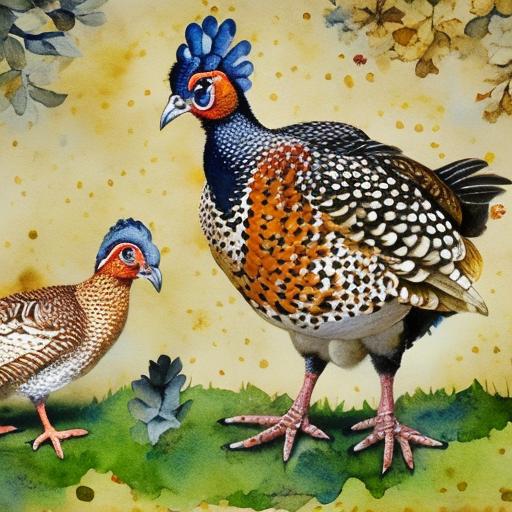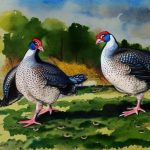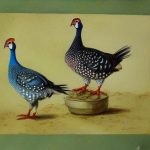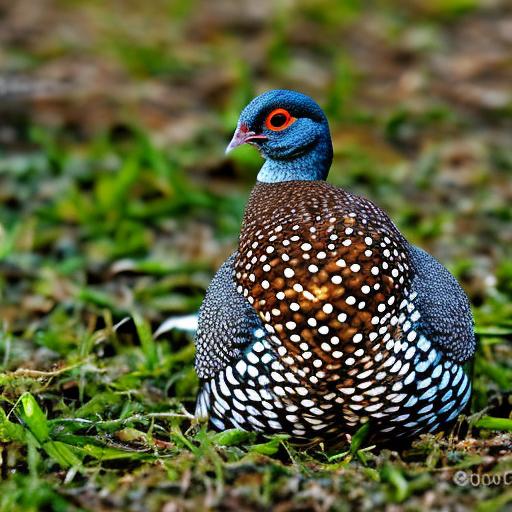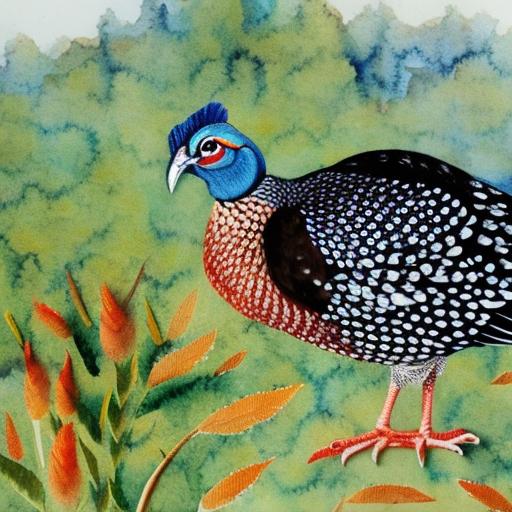Guinea fowl, also known as pintades, are domesticated birds that are native to Africa. They are popular for their unique appearance, delicious meat, and ability to control pests in the garden. Guinea fowl breeding is an important aspect of raising these birds, and understanding their seasonal breeding patterns is crucial for successful reproduction. Seasonal breeding refers to the natural reproductive cycle of guinea fowl, which is influenced by environmental factors such as temperature, daylight hours, and food availability. By understanding the breeding cycle and factors affecting guinea fowl reproduction, breeders can optimize their breeding programs and ensure the health and productivity of their flock.
Key Takeaways
- Guinea fowl breeding is influenced by seasonal changes, with specific breeding periods throughout the year.
- Understanding the breeding cycle of guinea fowl is crucial for successful breeding and raising of healthy chicks.
- Factors such as temperature, daylight length, and nutrition can significantly impact the breeding success of guinea fowl.
- Providing proper housing, nutrition, and minimizing stress are essential tips for successful guinea fowl breeding.
- Challenges of guinea fowl breeding include predation, disease, and low fertility rates, requiring careful management and monitoring.
Understanding the Breeding Cycle of Guinea Fowl
The breeding cycle of guinea fowl is influenced by the changing seasons and environmental conditions. In general, guinea fowl are seasonal breeders, with the peak breeding season occurring in the spring and early summer. As the days lengthen and temperatures rise, guinea fowl become more active and begin to exhibit mating behaviors. During this time, male guinea fowl will display their colorful plumage and vocalize loudly to attract females. Once a pair has formed, the female will begin to lay eggs in a secluded nest site, typically on the ground or in a hidden location. Guinea fowl are known for their strong maternal instincts, and the female will diligently incubate her eggs for about 26-28 days before they hatch. After hatching, the chicks are precocial and able to feed themselves shortly after birth. Understanding the natural breeding cycle of guinea fowl is essential for breeders to provide the appropriate conditions for successful reproduction.
Guinea fowl are known for their strong territorial instincts and may become aggressive towards other birds or humans during the breeding season. Additionally, guinea fowl may be more vocal and noisy during this time, which can be disruptive in residential areas. Breeders should be prepared to manage these behaviors and provide adequate space and privacy for breeding pairs. It is also important to monitor the health and well-being of breeding guinea fowl, as they may be more susceptible to stress and disease during this time. By understanding the breeding cycle of guinea fowl, breeders can anticipate and address these behaviors to ensure a successful breeding season.
Factors Affecting Guinea Fowl Breeding
Several factors can affect the breeding success of guinea fowl, including environmental conditions, nutrition, and genetics. Environmental factors such as temperature and daylight hours play a significant role in triggering the breeding behavior of guinea fowl. As the days lengthen and temperatures rise in the spring, guinea fowl become more active and begin to exhibit mating behaviors. Breeders should take these seasonal changes into account when planning their breeding programs and provide appropriate lighting and temperature control in their facilities. Nutrition is another critical factor that can impact the breeding success of guinea fowl. A well-balanced diet that meets the nutritional needs of breeding birds is essential for egg production, fertility, and chick development. Breeders should provide a diet rich in protein, vitamins, and minerals to support the reproductive health of their flock.
Genetics also play a significant role in the breeding success of guinea fowl. Selecting healthy, genetically diverse breeding stock is essential for producing strong and productive offspring. Breeders should carefully evaluate the genetic traits of their birds and avoid inbreeding to maintain the overall health and vitality of their flock. By considering these factors and implementing appropriate management practices, breeders can optimize the breeding success of their guinea fowl.
Tips for Successful Guinea Fowl Breeding
1. Provide adequate nesting sites: Guinea fowl prefer to lay their eggs in secluded nest sites on the ground or in hidden locations. Breeders should provide suitable nesting areas that are safe, clean, and protected from predators.
2. Monitor breeding behavior: Observing the mating behaviors of guinea fowl can provide valuable insights into their reproductive readiness. Breeders should watch for signs of courtship, such as vocalizations, displays of plumage, and mating rituals.
3. Maintain optimal nutrition: A well-balanced diet that meets the nutritional needs of breeding guinea fowl is essential for egg production, fertility, and chick development. Breeders should provide a diet rich in protein, vitamins, and minerals to support the reproductive health of their flock.
4. Manage stress and aggression: Breeding guinea fowl may exhibit territorial behaviors and aggression towards other birds or humans. Providing adequate space and privacy for breeding pairs can help minimize stress and aggression during the breeding season.
5. Monitor health and wellness: Breeding guinea fowl may be more susceptible to stress and disease during the breeding season. Breeders should closely monitor the health and wellness of their flock and provide appropriate veterinary care as needed.
6. Plan for chick rearing: Once the eggs hatch, breeders should be prepared to provide appropriate care for the chicks, including access to food, water, shelter, and protection from predators.
By following these tips and implementing appropriate management practices, breeders can increase the likelihood of successful guinea fowl breeding.
Challenges of Breeding Guinea Fowl
Breeding guinea fowl can present several challenges for breeders, including managing aggressive behavior, providing adequate nesting sites, and ensuring optimal nutrition for breeding birds. During the breeding season, guinea fowl may become more territorial and aggressive towards other birds or humans. This behavior can pose challenges for managing a flock, especially in residential areas where noise and aggression may be disruptive. Breeders should be prepared to manage these behaviors by providing adequate space and privacy for breeding pairs and monitoring their interactions with other birds or animals.
Providing suitable nesting sites for guinea fowl can also be challenging, as they prefer to lay their eggs in secluded locations on the ground or in hidden areas. Breeders should carefully design their facilities to provide safe, clean, and protected nesting areas for their flock. Additionally, ensuring optimal nutrition for breeding guinea fowl is essential for egg production, fertility, and chick development. Providing a well-balanced diet that meets the nutritional needs of breeding birds can be challenging, especially if resources are limited or if environmental conditions impact food availability.
Importance of Seasonal Breeding for Guinea Fowl

Seasonal breeding is an important aspect of guinea fowl reproduction that is influenced by environmental factors such as temperature, daylight hours, and food availability. By following their natural breeding cycle, guinea fowl can optimize their reproductive success and ensure the health and productivity of their offspring. Seasonal breeding allows guinea fowl to synchronize their reproductive behaviors with favorable environmental conditions, such as increased daylight hours and warmer temperatures in the spring and early summer. This natural timing helps to maximize egg production, fertility, and chick survival rates.
Seasonal breeding also plays a crucial role in maintaining the overall health and vitality of guinea fowl populations. By following their natural reproductive cycle, guinea fowl can avoid the stress and health risks associated with prolonged or out-of-season breeding. This helps to ensure that breeding birds are in optimal condition for reproduction and that their offspring have a higher likelihood of survival. Additionally, seasonal breeding can help to maintain genetic diversity within guinea fowl populations by synchronizing mating behaviors and reducing the risk of inbreeding.
Conclusion and Future Considerations for Guinea Fowl Seasonal Breeding
In conclusion, understanding the seasonal breeding patterns of guinea fowl is essential for successful reproduction and flock management. By recognizing the factors that influence guinea fowl breeding behavior, breeders can optimize their breeding programs and ensure the health and productivity of their flock. Providing suitable nesting sites, monitoring breeding behavior, maintaining optimal nutrition, managing stress and aggression, monitoring health and wellness, and planning for chick rearing are all important considerations for successful guinea fowl breeding.
Looking ahead, future research on guinea fowl seasonal breeding could focus on developing strategies to mitigate challenges such as aggressive behavior, providing suitable nesting sites, ensuring optimal nutrition for breeding birds, and managing stress during the breeding season. Additionally, further studies on the genetic factors influencing guinea fowl reproduction could help breeders select healthy, genetically diverse breeding stock to maintain the overall health and vitality of their flock. By continuing to explore these topics, breeders can further improve their understanding of guinea fowl seasonal breeding and enhance their ability to successfully raise these unique birds.
If you’re interested in learning more about poultry farming, you might also want to check out an article on PoultryWizard.com about turning a shed into a chicken coop. This informative piece discusses the process of converting a shed into a suitable living space for chickens, which could be particularly useful if you’re considering raising guinea fowl alongside other poultry. You can read the full article here.
FAQs
What is a guinea fowl?
Guinea fowl are a type of bird native to Africa, known for their distinctive spotted feathers and loud calls. They are often kept for their meat and eggs, as well as for pest control in agricultural settings.
Are guinea fowl seasonal breeders?
Yes, guinea fowl are seasonal breeders, typically mating and laying eggs in the spring and early summer months. They are influenced by the length of daylight and temperature changes, which trigger their breeding behavior.
What is the breeding season for guinea fowl?
The breeding season for guinea fowl typically begins in the spring, around March or April, and can extend into the early summer months. This is when they are most likely to mate and lay eggs.
How do guinea fowl breed during the breeding season?
During the breeding season, male guinea fowl will display courtship behavior, such as puffing up their feathers and making loud calls to attract females. Once a pair has formed, the female will lay a clutch of eggs in a hidden nest, and both parents will take turns incubating the eggs.
Can guinea fowl breed outside of the breeding season?
While guinea fowl are primarily seasonal breeders, it is possible for them to breed outside of the typical breeding season under certain conditions, such as artificial lighting and temperature control. However, this is less common in natural or free-range settings.
Meet Walter, the feathered-friend fanatic of Florida! Nestled in the sunshine state, Walter struts through life with his feathered companions, clucking his way to happiness. With a coop that’s fancier than a five-star hotel, he’s the Don Juan of the chicken world. When he’s not teaching his hens to do the cha-cha, you’ll find him in a heated debate with his prized rooster, Sir Clucks-a-Lot. Walter’s poultry passion is no yolk; he’s the sunny-side-up guy you never knew you needed in your flock of friends!

